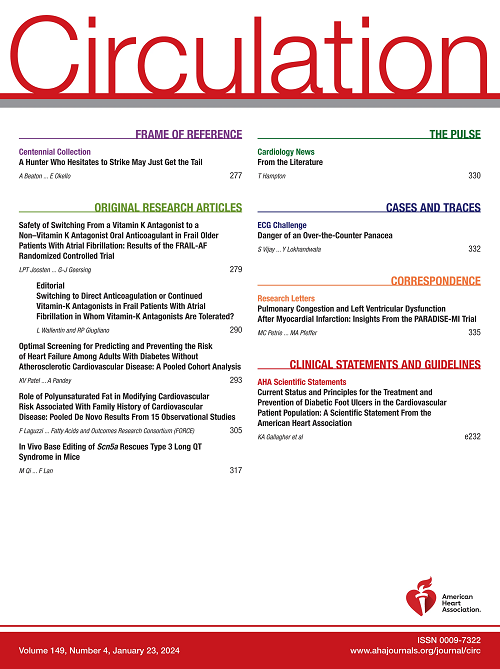第10部分:成人和儿童复苏的特殊情况:2025年美国心脏协会心肺复苏和紧急心血管护理指南。
IF 38.6
1区 医学
Q1 CARDIAC & CARDIOVASCULAR SYSTEMS
引用次数: 0
摘要
https://www.ahajournals.org/journal/circ在这些指南中,美国心脏协会为心脏骤停或因特殊情况而危及生命的成人和儿童提供了最新的复苏指南,包括过敏反应、哮喘、心脏介入套件中的心脏骤停、心脏手术后的心脏骤停、溺水、触电、气体栓塞、高后果呼吸道病原体、高钾血症、高热、低温、左心室辅助装置失效,妊娠,肺栓塞,以及苯二氮平类药物,β受体阻滞剂,钙通道阻滞剂,可卡因,氰化物,地高辛和相关心脏糖苷,局部麻醉全身毒性,高铁血红蛋白血症,阿片类药物,有机磷和氨基甲酸酯,钠通道阻滞剂,拟交感神经药物和挥发性烃所致的中毒。建议也提供了替代心肺复苏和使用体外膜氧合中毒患者。患有这些疾病的成人和儿童需要调整基本生命支持和高级生命支持。这些指南是基于系统的证据审查,并为成人和儿童提供单独的分级建议。本文章由计算机程序翻译,如有差异,请以英文原文为准。
Part 10: Adult and Pediatric Special Circumstances of Resuscitation: 2025 American Heart Association Guidelines for Cardiopulmonary Resuscitation and Emergency Cardiovascular Care.
https://www.ahajournals.org/journal/circ In these guidelines, the American Heart Association provides updated guidance for resuscitation of adults and children in cardiac arrest or with a life-threatening condition due to special circumstances, including anaphylaxis, asthma, cardiac arrest in the cardiac intervention suite, cardiac arrest following cardiac surgery, drowning, electrocution, gas embolism, high-consequence respiratory pathogens, hyperkalemia, hyperthermia, hypothermia, left ventricular assist device failure, pregnancy, pulmonary embolism, and poisoning due to benzodiazepines, β-blockers, calcium channel blockers, cocaine, cyanide, digoxin and related cardiac glycosides, local anesthetic systemic toxicity, methemoglobinemia, opioids, organophosphates and carbamates, sodium channel blockers, sympathomimetics, and volatile hydrocarbons. Recommendations are also provided for alternatives to cardiopulmonary resuscitation and the use of extracorporeal membrane oxygenation for poisoned patients. Adults and children with these conditions require modification of basic life support and advanced life support. These guidelines are based on systematic evidence reviews and provide separate graded recommendations for adults and children.
求助全文
通过发布文献求助,成功后即可免费获取论文全文。
去求助
来源期刊

Circulation
医学-外周血管病
CiteScore
45.70
自引率
2.10%
发文量
1473
审稿时长
2 months
期刊介绍:
Circulation is a platform that publishes a diverse range of content related to cardiovascular health and disease. This includes original research manuscripts, review articles, and other contributions spanning observational studies, clinical trials, epidemiology, health services, outcomes studies, and advancements in basic and translational research. The journal serves as a vital resource for professionals and researchers in the field of cardiovascular health, providing a comprehensive platform for disseminating knowledge and fostering advancements in the understanding and management of cardiovascular issues.
 求助内容:
求助内容: 应助结果提醒方式:
应助结果提醒方式:


